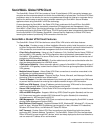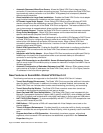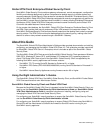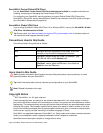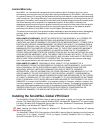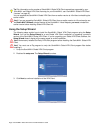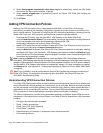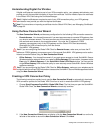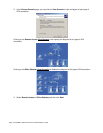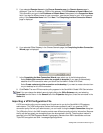Page 6 SonicWALL Global VPN Client 4.0 Administrator’s Guide
• Automatic Reconnect When Error Occurs - Allows the Global VPN Client to keep retrying a
connection if it encounters a problem connecting to a peer. This feature allows the Global VPN Client
to automatically make a connection to a SonicWALL VPN gateway that is temporarily disabled,
without manual intervention.
• Ghost Installation for Large Scale Installations - Enables the Global VPN Client’s virtual adapter
to get its default address after installation and then create a ghost image.
• NT Domain Logon Script Support - Allows Global VPN Clients to perform Windows NT/2000
domain authentication after establishing a secure IPSec tunnel. The SonicWALL VPN gateway
passes the logon script as part of the Global VPN Client configuration. This feature allows the VPN
user to have access to mapped network drives and other network services.
• Dual Processor Support - Enables the Global VPN Client to operate on dual-processor computers.
• Group Policy Management - Global VPN Clients access can be customized and restricted to
specific subnet access (Requires SonicOS Enhanced).
• Hub and Spoke VPN Access - Allows IP addressing from SonicWALL VPN Gateway’s DHCP Server
to Global VPN Client for configuring a different subnet for all remote Global VPN Clients than the
subnet of the LAN. Makes hub-and-spoke VPN access simpler. When a Global VPN Client
successfully authenticates with the central site, it receives a virtual IP address that also grants it
access to other trusted VPN sites.
• Default VPN Connections File - Enables the SonicWALL administrator to configure and distribute
the corporate VPN connections with the Global VPN Client software to streamline VPN client
deployment.
• Integration with Dial-Up Adapter - Allows Global VPN Client connections using Microsoft Dial-Up
Networking or third-party dial-up applications either as an automatic backup to a broadband
connection or as the primary connection.
• Single VPN Connection to any SonicWALL Secure Wireless Appliance for Roaming - Allows
users to use a single VPN connection policy to access the networks of multiple SonicWALL Secure
Wireless appliances.
• Automatic Configuration of Redundant Gateways from DNS - When an IPSec gateway domain
name resolves to multiple IP addresses, the Global VPN Client (version 2.1.0.0 or higher) uses the
IP addresses in the list as failover gateways.
New Features in SonicWALL Global VPN Client 4.0
The following new features are supported on the SonicWALL Global VPN Client 4.0 release:
• Tunnel State Display Enhancement - The Global VPN Client now provides additional information
about the state of VPN tunnels. In addition to the states of enabled, disabled, and connected, the
Global VPN Client now indicates when tunnels are authenticating, provisioning, and connecting.
• Tunnel Status Pop-Up Window - The Global VPN Client now alerts users when tunnels are
connected or disconnected by displaying a small pop-up window.
• Smart Card and USB Token Authentication - The Global VPN Client is now integrated with the
Microsoft Cryptographic Application Program (MS CryptoAPI or MSCAPI), which enables the Global
VPN Client to support user authentication using digital certificates on Smart cards and USB tokens.
• NAT-T-IKE-03 Draft Support - To improve compatibility with NAT-T-IKE-03, UDP encapsulation now
uses port 4500 instead of port 500.
• DNS Redirect - DNS queries to DNS suffix associated with Virtual Adapter are not sent on the
physical adapter.
• Tunnel All Support Enhancement - Provides the ability to route clear traffic to directly connected
network interfaces that are configured with the Route All policy, which is generally used in the WLAN
zone.
• Program Auto-Start on VPN Connection - Automatically launches a program, with optional
arguments, when successful VPN connections are established, as specified in the Connection
Properties dialog box.








